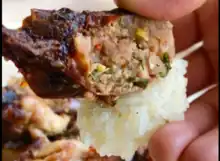Lao sausage
Lao sausage, also known as Laotian sausage or sai oua (Lao: ໄສ້ອັ່ວ, also sai ua), refers to a popular type of Lao sausage made from coarsely chopped fatty pork seasoned with lemongrass, galangal, kaffir lime leaves, shallots, cilantro, chillies, garlic, salt, sticky rice and fish sauce. Lao sausage is a broad term used to describe the local variant of Lao-style sausages found in Laos, Northern, and Northeastern Thailand.

 Sai oua | |
| Alternative names | Sai oua, sai ua |
|---|---|
| Type | Sausage |
| Place of origin | Laos |
| Region or state | Nationwide |
| Main ingredients | Pork, Beef |
Sai oua is an ancient Lao word for sausage,[1] literally sai (intestine) oua (stuffed). Sai oua is a spicy sausage originating from Luang Prabang, Laos.[2][3][4] Luang Prabang was once the royal capital and seat of power of the Kingdom of Lan Xang (1353-1707). The ancient city of Luang Prabang is considered to be the cradle of Lao culture and cuisine.[5][6][7] At the height of its power, Luang Prabang's influence stretches from the borders of Sipsongpanna (China) to Steung Treng (Cambodia), from the eastern border along the Annamite Range with Vietnam to the western border Khorat Plateau (Northeastern Thailand (Isan)) and its sister kingdom of Lan Na[8][9]
Types
There are two types of Sai oua in Laos.
- Sai oua moo or pork sausage, literally sai (intestine) oua (stuffed) moo (pork).[10] The traditional recipe for sai oua moo served to Laotian royalties can be found in a collection of hand written recipes from Phia Sing (1898-1967), the king's personal chef and master of ceremonies. Phia Sing's hand written recipes were compiled and published for the first time in 1981.[10]
- Sai oua kwai or water buffalo sausage, literally sai (intestine) oua (stuffed) kwai (water buffalo)[4]
Similar sausages
Sausages in Lao cuisine include sai gork (Lao: ໄສ້ກອກ, "soured Lao sausage"),[11] "sai gork wan" (Lao: ໄສ້ກອກຫວານ; sweet sausage), and "sai gork leuat" (Lao: ໄສ້ກອກເລືອດ; blood sausage), naem (Lao: ແໜມ; sour sausage) and "mam" (Thai: หม่ำ; beef liver sausage).
See also
References
- Massie, Victor-Alphonse (1894). Dictionnaire français-laotien: Mission Pavie, exploration de l' indochine (Latin characters). p. 108.
- Harry, Carry It Like (January 19, 2020). "10 Things to Do in Luang Prabang".
- Carter, Sarah (November 4, 2015). "Laos Food and Laos Drinks: Your What To Eat in Laos Guide".
- "15 of the Best Authentic Laos Food You Want to Enjoy in Luang Prabang". March 12, 2019.
- "Discover why Laos is the world's next great foodie destination". Travel. July 10, 2019.
- "The king ate sticky rice: Cooking, past and present, in Luang Prabang, Laos". Los Angeles Times. October 1, 2019.
- "Luang Prabang, Laos - Travel Guide for Food Lovers (Where to Eat, Drink, Stay)". Migrationology - Food Travel Blog.
- Bock, Carl. Temples and Elephants: The Narrative of a Journey of Exploration Through Upper Siam and Laos (London: Low, I884; reprinted Bangkok: White Lotus, 1985)
- Stuart-Fox, Martin. The French in Laos, 1887–1945. Modern Asian Studies. Vol. 29, no. 1, 1995. pp 111 – 139. Print.
- "Lao Recipes". www.seasite.niu.edu.
- "New Lao Sai Oua vs Sai Gok". Laos In The House.